#(this is in England in early 1710 btw)
Explore tagged Tumblr posts
Text

OKAY a quick little sketch of an OC before i go to bed..... his name is edwin (actually edward), and he likes books :) i think this is my first time drawing him on digital... 👀
Edit: thank you all sm for all the likes omg!!! QAQ💕
#gu6chan's doodles#gu6chan's muses#Edwin#i love him very much the LONG story is that he's a demon taking the form of.... a 14??? ish???? year boy to look after one SPECIFIC human#who happens to be a very touch starved religious son of a duke who's so sickly he needs a wheelchair to get around#(this is in England in early 1710 btw)#ofc religious boy doesnt know hes a demon or was even 'made' by demons he just loves his friend ❤️ edwin does not#he just wants to read his books and stories.......... :( he also has a sort of faustian pact with said religious boy's cousin/fiancée!!!#thats a whole different can of worms though lmao#i hope you like him :)))) annoy him (affectionately) for me lmao
4 notes
·
View notes
Text
All right Tumblr, let’s talk about art theft in PowerPoint format, because I’m hearing a lot of complaints, and some artists I know have literally stopped putting out art to the public because of rampant theft of their art.
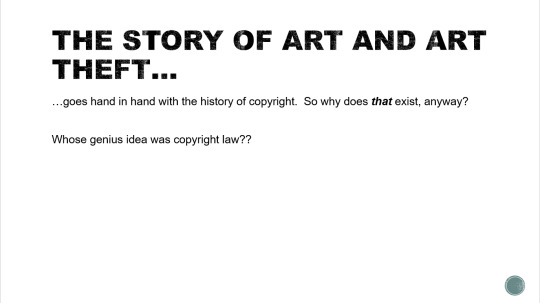
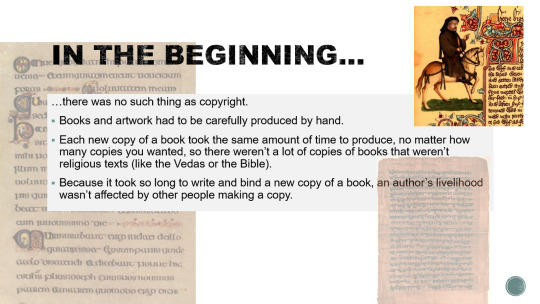
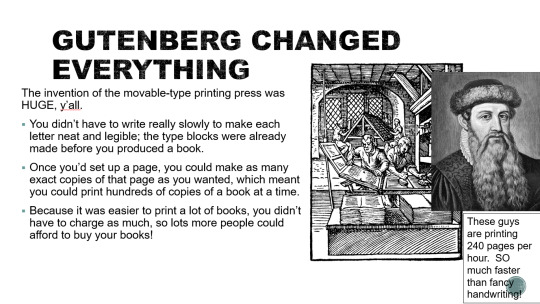
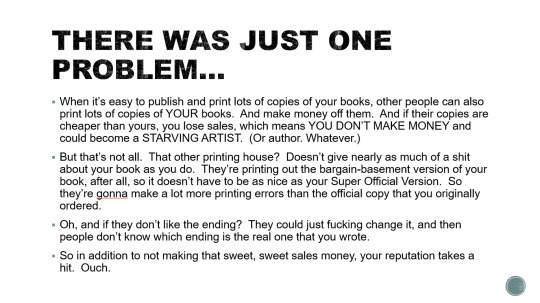
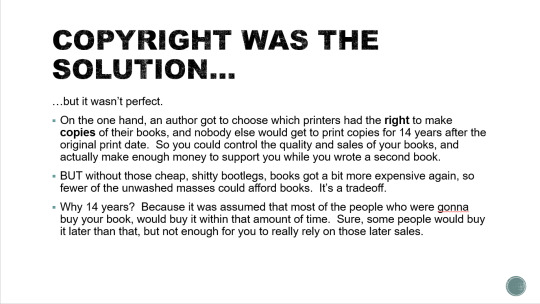
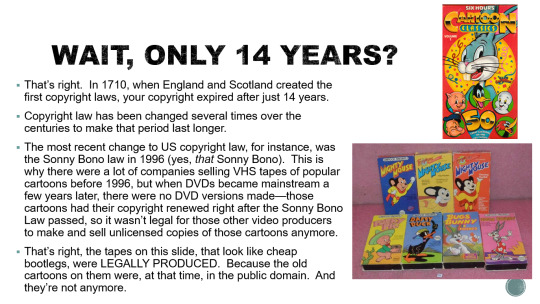
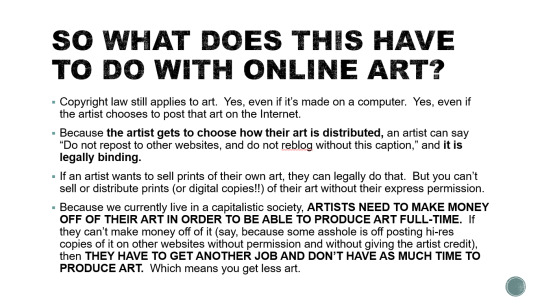
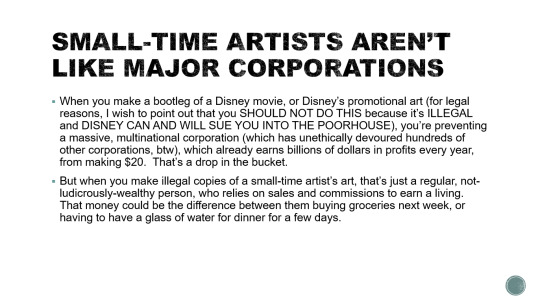
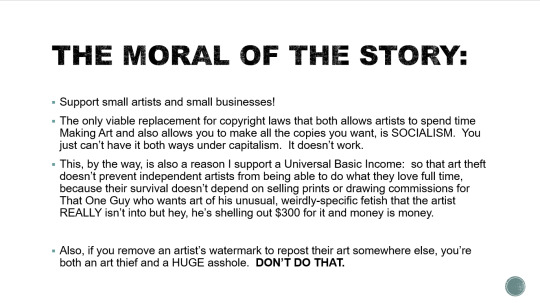
[Transcription: The story of art and art theft goes hand in hand with the history of copyright. So why does that exist, anyway? Whose genius idea was copyright law??
In the beginning there was no such thing as copyright.
Books and artwork had to be carefully produced by hand.
Each new copy of a book took the same amount of time to produce, no matter how many copies you wanted, so there weren’t a lot of copies of books that weren’t religious text (like the Vedas or the Bible).
Because it took so long to write and bind a new copy of a book, an author’s livelihood wasn’t affected by other people making a copy.
Gutenberg changed everything
The invention of the movable-type printing press was HUGE, y’all.
You didn’t have to write really slowly to make each letter neat and legible; the type blocks were already made before you produced a book.
Once you’d set up a page, you could make as many exact copies of that page as you wanted, which meant you could print hundreds of copies of a book at a time.
Because it was easier to print a lot of books, you didn’t have to charge as much, so lots more people could afford to buy your books!
(Image of people using an early printing press with the caption, “These guys are printing 240 pages per hour. So much faster than fancy handwriting!”)
There was just one problem...When it’s easy to publish and print lots of copies of your books, other people can also print lots of copies of your books. And make money off them. And if their copies are cheaper than yours, you lose sales, which means you don’t make money and could become a starving artist. (Or author. Whatever.)
But that’s not all. That other printing house? Doesn’t give nearly as much of a shit about your book as you do. They’re printing out the bargain-basement version of your book, after all, so it doesn’t have to be as nice as your Super Official Version. So they’re gonna make a lot more printing errors than the official copy that you originally ordered.
Oh, and if they don’t like the ending? They could just fucking change it, and then people don’t know which ending is the real one that you wrote.
So in addition to not making that sweet, sweet sales money, your reputation takes a hit. Ouch.
Copyright was the solution, but it wasn’t perfect. On the one hand, an author got to choose which printers had the right to make copies of their books, and nobody else would get to print copies for 14 years after the original print date. So you could control the quality and sales of your books, and actually make enough money to support you while you wrote a second book.
BUT without those cheap, shitty bootlegs, books got a bit more expensive again, so fewer of the unwashed masses could afford books. It’s a tradeoff.
Why 14 years? Because it was assumed that most of the people who were gonna buy your book, would buy it within that amount of time. Sure, some people would buy it later than that, but not enough for you to really rely on those later sales.
Wait, only 14 years?
That’s right. In 1710, when England and Scotland created the first copyright laws, your copyright expired after just 14 years. Copyright law has been changed several times over the centuries to make that period last longer.
The most recent change to US copyright law, for instance, was the Sonny Bono law in 1996 (yes, that Sonny Bono). This is why there were a lot of companies selling VHS tapes of popular cartoons before 1996, but when DVDs became mainstream a few years later, there were no DVD versions made--those cartoons had their copyright renewed right after the Sonny Bono Law passed, so it wasn’t legal for those other video producers to make and sell unlicensed copies of those cartoons anymore.
(Picture of VHS tapes with cheap, off-model images of Mighty Mouse, Bugs Bunny, Porky Pig, and Daffy Duck on the covers.)
That’s right, the tapes on this slide, that look like cheap bootlegs, were legally produced. Because the old cartoons on them were, at that time, in the public domain. And they’re not anymore.
So what does this have to do with online art?
Copyright law still applies to art. Yes, even if it’s made on a computer. Yes, even if the artist chooses to post that art on the Internet.
Because the artist gets to choose how their art is distributed, an artist can say “Do not repost to other websites, and do not reblog without this caption,” and it is legally binding.
If an artist wants to sell prints of their own art, they can legally do that. But you can’t sell or distribute prints (or digital copies!) of their art without their express permission.
Because we currently live in a capitalistic society, artists need to make money off of their art in order to be able to produce art full-time. If they can’t make money off of it (say, because some asshole is off posting hi-res copies of it on other websites without permission and without giving the artist credit), then they have to get another job and don’t have as much time to produce art. Which means you get less art.
Small-time artists aren’t like major corporations. When you make a bootleg of a Disney Movie, or Disney’s promotional art (for legal reasons, I wish to point out that you should not do this because it’s illegal and Disney can and will sue you into the poorhouse), you’re preventing a massive, multinational corporation (which has unethically devoured hundreds of other corporations, btw), with already earns billions of dollars in profits every year, from making $20. That’s a drop in the bucket.
But when you make illegal copies of a small-time artist’s art, that’s just a regular, not-ludicrously-wealthy person, who relies on sales and commissions to earn a living. That money could be the difference between them buying groceries next week, or having to have a glass of water for dinner for a few days.
The moral of the story:
Support small artists and small businesses!
The only viable replacement for copyright laws that both allows artists to spend time Making Art and also allows you to make all the copies you want, is socialism. You just can’t have it both ways under capitalism. It doesn’t work.
This, by the way, is also a reason I support a Universal Basic Income: so that art theft doesn’t prevent independent artists from being able to do what they love full time, because their survival doesn’t depend on selling prints or drawing commissions for That One Guy who wants art of his unusual, weirdly-specific fetish that the artist REALLY isn’t into but hey, he’s shelling out $300 for it and money is money.
Also, if you remove an artist’s watermark to repost their art somewhere else, you’re both an art thief and a huge asshole. Don’t do that.
End of transcription.]
8 notes
·
View notes